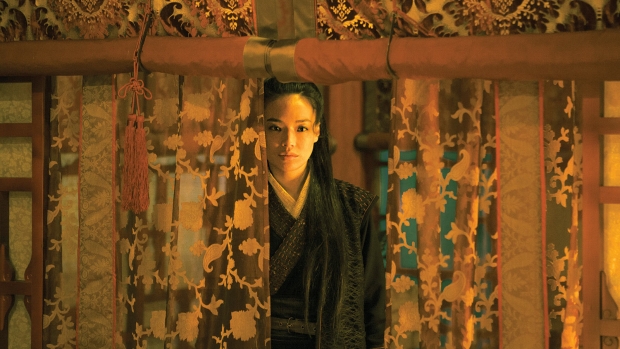GEORGE KUHN reviews Hou Hsiao-Hsien’s martial arts film ‘The Assassin’.
Returning after an absence of eight years, director Hou Hsiao-Hsien brings us a reimagining of the classic ninth century wuxia story Nie Yinniang, originally by Pei Xing, and named after the deadly female assassin here played by Shu Qi (an actress who has worked with Hsiao-Hsien three times before). But Hsiao-Hsien’s The Assassin may be the least conventional martial arts movie ever made. With only five fights in The Assassin‘s one hour and forty-five minute duration, if you’re looking for the high octane, non-stop action traditionally associated with this genre then you’re watching the wrong film.
The Assassin is mesmerisingly beautiful, shot almost exclusively from a distance on a steady cam, with each frame full of painstaking detail and a rich and delicate palette. It consistently balances verdant trees against opulent ninth century Chinese architecture and crowd movements reminiscent of the best of Akira Kurosawa. Watching The Assassin feels like slowly unravelling a scroll painting. It’s the experience of appreciating every aspect of each scene as extensions of the characters, from the chirping cicadas to the delicate fluttering of curtains.
The film follows Nie Yinniang, a woman trained since she was a child by an enigmatic nun and moulded into a perfect tool to murder the corrupt political leaders that plague Hsiao-Hsien’s ninth century China. The prologue of the film, shot in sharp black and white and tightly framed in the 1.33:1 ratio, first provides a showcase of the martial perfection that you expect to see in this type of film, as Yinniang manages to murder a state official with the precision of a surgeon and the grace of a ballet dancer. However, she fails her next mission, when mercy for her target’s nearby child stays her blade. As penance, Yinniang is ordered by her master to kill Tian Ji’an, a man she was once betrothed to, who is now a prominent military figure. This is the core conflict of the film, setting the two main principles of wuxia, ‘yi’ (righteousness) and ‘xin’ (honour) against each other.

The Assassin quickly switches into rich colour, and for the first time you get to experience its true beauty. Every part of every frame is artistically stunning. It all feels carefully composed: the way light falls through the trees, or the shimmering gold of the lavish ornamentation of the palaces. Filmed high up in Mongolia, Hsiao-Hsien gives the film an immersive realism that makes it a delight to spend time in his world.
Yinniang’s personal drama is set against the backdrop of a crumbling peace between the resolute court and a distant province seeking freedom from the court’s rule. However, this political drama is unravelled at such a glacial pace that most of the time it is more engaging to luxuriate in Hsiao-Hsien’s fully realised world. At times the dialogue feels like part of Hsiao-Hsien’s world design, with politicians talking in classical Chinese, conversing by way of implications and allusions. The complex court drama isn’t something meant to enthral you by virtue of intrigue, but by conveying an intensely truthful realisation of Hsao-Hsien’s setting.
In fact, these characters give out relevant information so grudgingly that the plot advances at the speed of continental drift. When the plot does develop, the developments come out of inaction. The times Yinniang manages to restrain herself speak volumes more than when she is expertly cutting through henchmen.
This is shown even more by the expert camerawork. The film tends to use slow horizontal movements, or wide angle shots from such a distance that it feels like a landscape painting. This kind of camerawork continues through the less pivotal fights, making them feel like part of the court drama. However, the important fights in the film where her hand is forced (for example when she fights Tian Ji’an’s wife) make use of fast, whiplash camera movement. It is as if the camerawork is synchronised to Yinniang’s heartbeat.

The Assassin is a film that takes the tropes of wuxia and turns them on their heads, while still giving the impression of a lovingly realised folk tale. Where most wuxia protagonists are dedicated to honour and righteousness, The Assassin is caught between the two. Where most wuxia films use fast paced elaborate fight scenes to create tension, The Assassin uses indecision to create tension. On top of all this The Assassin manages to immerse you in a world with all the fairy tale beauty of golden palaces and pristine forests.
What the movie lacks in thrilling plot or scintillating dialogue it more than makes up for in sheer aesthetic beauty. The Assassin manages to bring a freshness and magic to a genre that is usually so susceptible to cliché.





